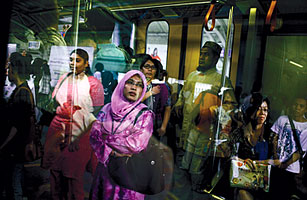Malaysia’s New Journey

Common cause Malaysia’s three major races are reflected in one train carriage
By Michael Schuman (TIME)
Malaysia is that rare country with an unequivocal national narrative. It goes something like this: Malaysia’s 28 million people, comprising mainly Malays, Chinese and Indians, make up a moderate and modern emerging democracy. Unlike members of other multiethnic countries, they respect one another’s beliefs and values and share a commitment to achieving prosperity. The official religion is Islam, but other faiths are freely allowed and celebrated. This is one harmonious place.
Much of that narrative is true — but not all of it.
Malaysia’s economic miracle has stalled, and while the nation is, indeed, somewhat pluralistic, it is no melting pot. Indeed, it is a society where people define themselves first and foremost by race. (See pictures of Islam in Asia.)
The country’s political leadership has in some respects reinforced those ethnic identities. For the past 40 years, policymakers have doled out special privileges — in education and business — to one community: the majority Malays. The program is one of modern history’s greatest experiments in social engineering and possibly the world’s most extensive attempt at affirmative action. But the policies have also bred resentment among minorities, distorted the economy and undermined the concept of a single Malaysian identity.
Now a movement is gaining strength to finally change the system — and it’s coming from the very top. Prime Minister Najib Razak, 57, has surprised the country by advocating a fundamental reform of the pro-Malay program first introduced, ironically, by his father, who was Malaysia’s Prime Minister in the 1970s. Though the specifics of the new policies remain hazy, Najib’s intent is not. “I want Malaysia to be globally competitive,” he told TIME in an exclusive interview. “For that, we need to get every single Malaysian to be together.”
Najib’s proposals have simultaneously raised hopes, ire and fear. The mere idea of changing the affirmative-action system has reopened old wounds in Malaysian society and reactivated the long-running debate on how best to fuse Malays, Chinese and Indians into one nation. The direction Malaysia takes, moreover, has repercussions beyond its shores. The issues raised by Najib’s proposals are relevant to any upwardly mobile developing economy, especially a multicultural one: how to increase wealth and do so equitably. (Read “Why the Honeymoon is Over for Malaysia’s New PM.”)
In confronting these sensitive challenges, Najib is taking enormous political risks. The primary base of electoral support for Najib’s political party, the United Malays National Organization (UMNO), is the Malay community, and altering decades-old perquisites could cause voters to defect to the opposition. But Najib believes he has little choice. If Malaysia’s economy is to compete with China, India and other rapidly emerging neighbors, Najib sees no other route but reform. “The competition is much greater and some would describe it even as cutthroat,” Najib says. “There is a realization that what has worked in the past may not necessarily work in the future.”
The Malay Card
Najib is facing the same dilemma his predecessors have since the earliest days of Malaysian independence: balancing the perceived needs of the Malays, both political and economic, with those of the country as a whole. At the heart of the problem is the reverse-pyramid shape of the Malaysian economy. Though the Malays and other indigenous peoples, together known as bumiputra in Malay, make up about 60% of the population, they have traditionally been poorer than the Chinese and Indian immigrants, who have long dominated the nation’s business and trade. After Kuala Lumpur was struck by race riots in 1969, a shaken leadership determined that communal peace was impossible without economic balance. The result was the New Economic Policy (NEP), introduced in 1971, which aimed to raise the Malays’ share of the economic pie. Malays were given preferential access to public contracts and university scholarships. Any company listing on the stock market had to sell 30% of its shares to bumiputra investors. Though some measures have been softened or eliminated over the past two decades, many pro-Malay privileges remain. Certain government contracts are available only to bumiputra-controlled firms, for example. Malays even receive special discounts on home purchases. The affirmative-action program has become so ingrained in the Malaysian psyche that it is akin to a national ideology.
It is also controversial. Critics contend that the pro-Malay program too often benefits the connected few over its intended targets: the poor and struggling. All car-import permits, for example, are awarded to bumiputra-controlled firms, a policy intended to foster entrepreneurs in the community. But government audits have revealed that Malay businessmen with access to the permits sometimes sell them to minority traders who don’t — at an instant profit. (The Ministry of Trade and Industry, recognizing the problem, says it will phase out the permit system by 2020.) “Unfortunately, as [the NEP] was implemented over time, some of the zealots, politicians and bureaucrats included, tended to become more racial and emphasized more on the people who have relationships with them,” says Razaleigh Hamzah, an UMNO dignitary and former Finance Minister. “That’s where it went wrong.”

